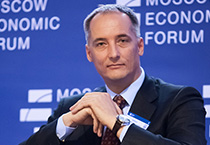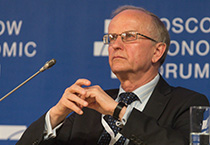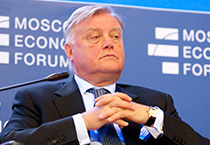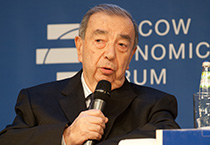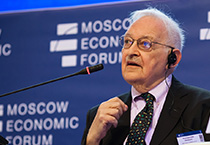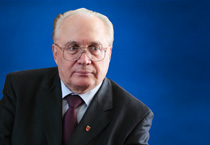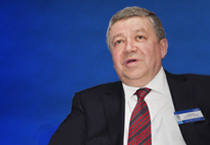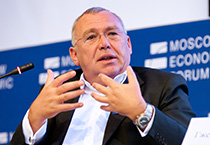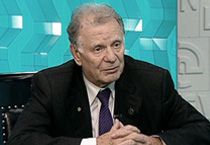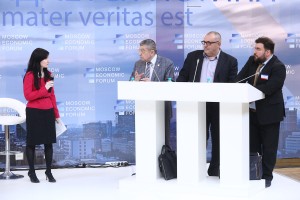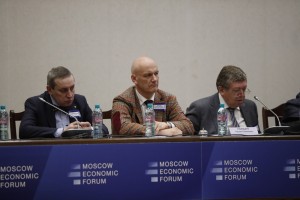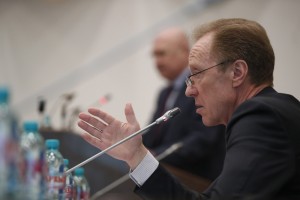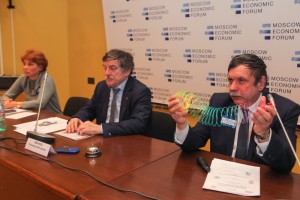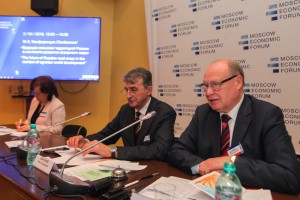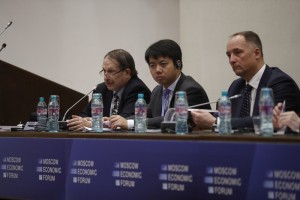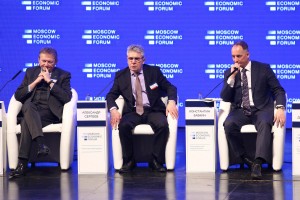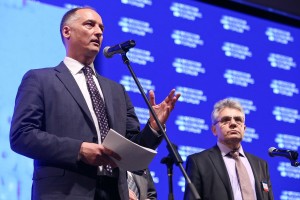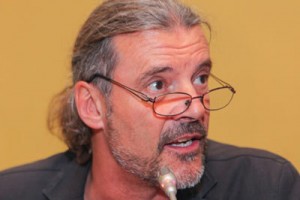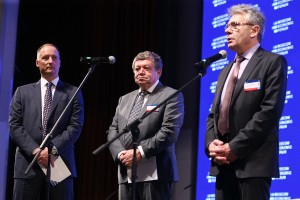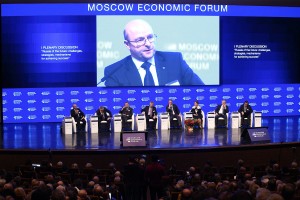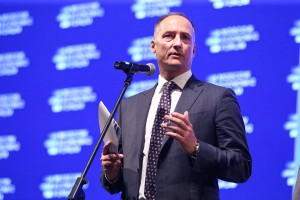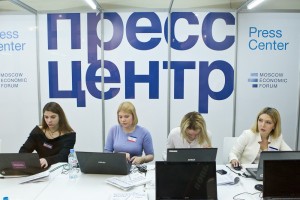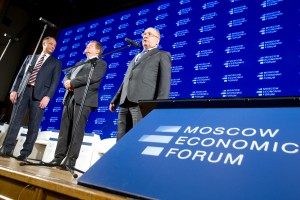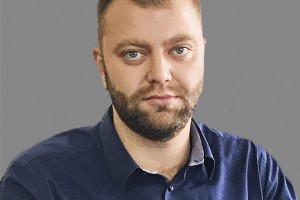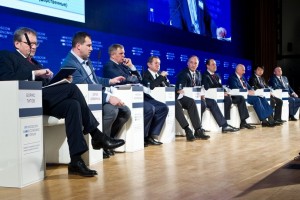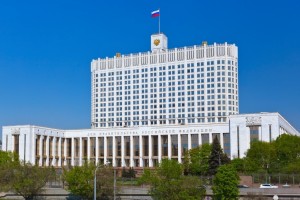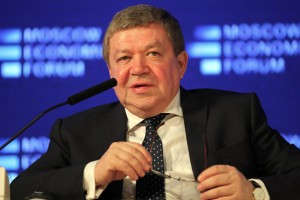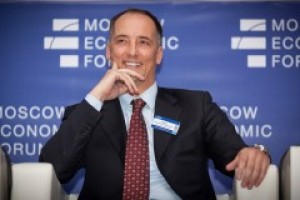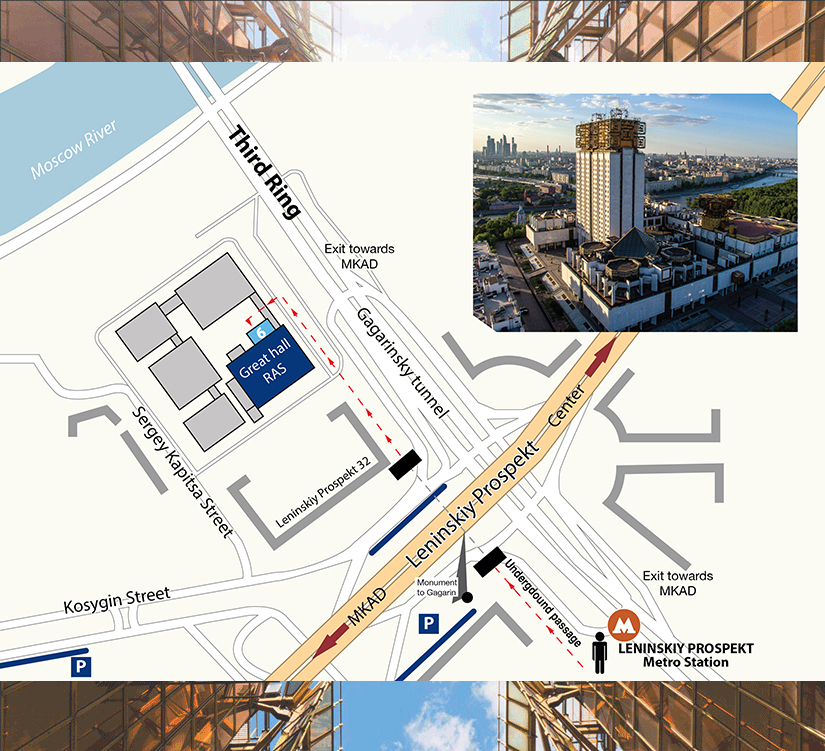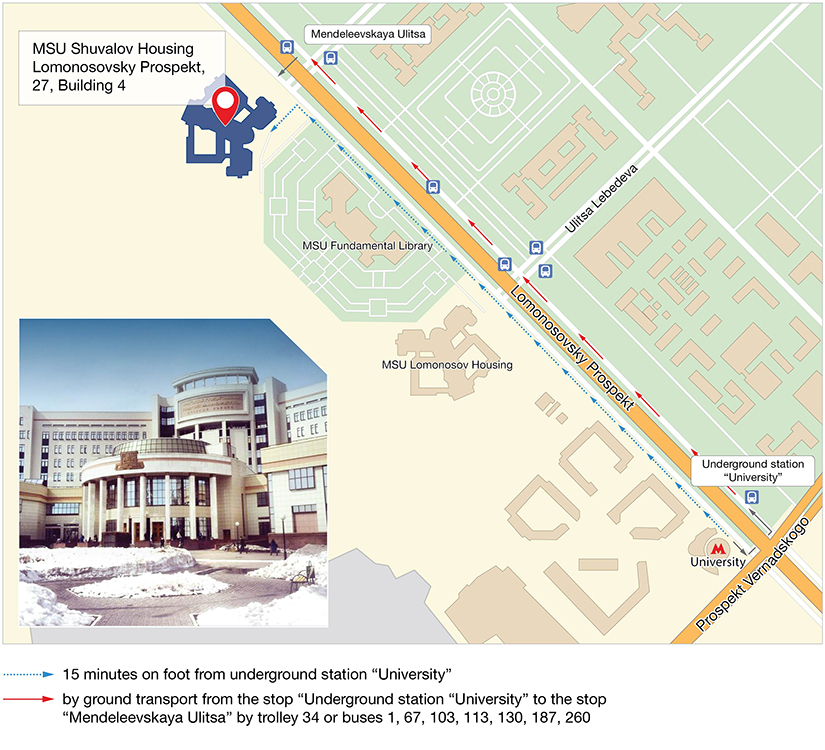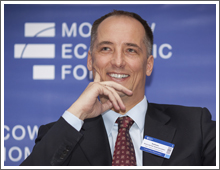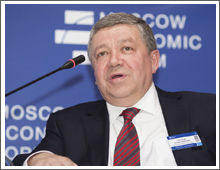About the forum
Moscow Economic Forum is an international expert platform for working out strategic decisions and anti-crisis programs aimed at the development of Russia's economic policy.
At the forum the contradictions of the course of Russia's development dominant today are analysed, the potential of alternative development and opportunities for its implementation are evaluated.
In 2013 the Forum was held for the first time. Venue — the Moscow State University — the oldest classic University in Russia. The Russian center of science and culture.
The VI Moscow economic forum will be held on April 3-4, 2018
with the assistance of Russian Academy of Sciences.
“The subject of MEF-2018 – "Russia and the world: image of the future".
The main objective of the forum - is formation of Russia's future image and search of answers to the following questions: "What goals do we set?", "What are we striving for?", "What role will Russia play in the world economy?", "What will be imported and what will be exported? What will our children be engaged in?", "What will our society be like, and what values will become ideals?"
Special attention at a forum will be paid to participation of young leading scientists, students of economic Russian higher education institutions, businessmen and public figures.
The agenda of a forum includes 4 plenary sessions and 20 thematic round tables devoted to: tendencies in world economy, geopolitical role of Russia, the strategy of economic development, influence of the existing valuable models on image of the future.
Central Forum will be held in Moscow on March 30–31 and will focus on:
“The turn of the world history. Russia’s new strategy”
Location: Shuvalov Housing, MSU named after M.V. Lomonosov
Address: Moscow, Lomonosovsky Prospekt, 27, Building 4
Its 25 years since the beginning of market reforms in Russia. False guidance provoked a prolonged lag of Russia behind the world powers. We are keeping the wrong course and it is not planned to change.
What do we have to do in order for Russia to become the world leader to year 2025? / How will it reflect on life of every citizen? / Is there an alternative to liberal policy in Russia?
On this and many other we will speak on Moscow Economic Forum March 30–31, 2017.
Main theme of the MEF 2016 was “25 years of market reforms in Russia and the world. What's next?”. Failure to understand the importance of the problems of creating economic subjects of the market economy, the wrong allocation of resources, the concept of shock therapy, because of which the bulk of the high-tech industries was lost, and gradualism led to expensive errors. The processes that occurred in our country in the recent past, allegedly in order to increase competition, have been tampered with destructive model, parasitizing on natural resources. The main result of MEF 2016: the Russian government needs the new course of economic policy.
Among the participants:
Dominique Strauss-Kahn — Managing Director of the International Monetary Fund from 2007 to 2011;
Gores Alferov — Nobel Prize in Physics (2000), Vice-President of RAS;
Giulietto Chiesa — an Italian journalist, writer and public figure;
Sergei Kolesnikov — President of the company “Technonikol”;
Vittorio Torrembini — Chairman of the Association of Italian entrepreneurs in Russia GIM-Unimpresa;
Nathan Hunt — Chairman of the Board, CERBA Moscow, Founder.
Main theme of the MEF 2015 was “A new course. Time does not wait”. Neoliberalism has exhausted itself — the conclusion made by the Forum. However, it dominates the economic policy, culture and education. This is a hindrance to the further development of Russia, which has huge potential. Non-commodity production creates a demand for skilled creative staff, the conditions for the emergence and implementation of various innovations, the conditions for technological, social and demographic progress, and it creates a request to improve the human environment.
Among the participants:
Evgeniy Savchenko — the Governor of the Belgorod region;
Daisuke Kotegawa — Executive Director of the International Monetary Fund (IMF) from Japan in 2007–2010;
Sergei Arbuzov — Chairman of the Association “Research Center of economic and socio-cultural development of the CIS countries, Central and Eastern Europe”;
Tair Mansurov — Member of the Board (Minister) of Energy and Infrastructure of the Eurasian Economic Commission;
Valeriy Fadeev — editor in chief of the magazine “Expert” (1998), a member of the Public Chamber.
The slogan of MEF-2014 is “For the development of production!” In the modern world, if the nation does create, it becomes sick deprives itself of the future. The development of national production makes science and education popular, increases the welfare of the population, improves the moral climate in society, sets new ambitious goals for the young generations, moves the economy forward, makes life and work in the country comfortable and the future — clear and promising. At the Forum the participants discussed how the economic policy should change so that the production becomes profitable in Russia.
Among the participants:
Grzegorz Kolodko — professor in Kozminsky University, Deputy Prime Minister and Finance Minister of Poland (1994–1997, 2002–2003);
Yevgeny Primakov — Chairman of the Government of Russia (1998–1999);
Vladimir Yakunin — head of JSC “Russian Railways”;
Kerstin Kaiser — member of Parliament of Brandenburg, Germany;
Sergey Glazyev — Advisor to the President of Russia, academician of the Russian Academy of Sciences.
The first Forum was held under the slogan “against market fundamentalism — for sound economic policy”. The participants agreed that the current ultra-liberal policy in Russia has not justified itself. For the last 22 years in the country 20 000 industrial enterprises and 15 000 settlements disappeared, the population decreased, the unemployment increased. The Forum produced proposals for reforms in tax, industrial, agricultural and monetary policies, which allow to realize Russian development potential.
Among the participants:
Immanuel Wallerstein — professor of Yale University, USA;
Viktor Sadovnichiy — rector of Moscow State University named after M.V. Lomonosov;
Zhores Alferov — winner of the Nobel prize in physics 2000, Vice-President of the Russian Academy of Sciences;
Alfred Gusenbauer — Federal Chancellor of Austria in 2007–2008;
Askar Akayev — academician of the Russian Academy of Sciences, the first President of Kyrgyzstan.
Co-chairmen of MEF
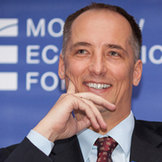
Owner of the machine-building plant «Rostselmash», founder of the Central Council of the movement «Agrarian Russia», President of the Association of agricultural producers «Rosagromash», the developer of roadmap for the of Russian agriculture until 2020. A member of the Bureau of the Central Council of the Union of machine builders of Russia.
In 2004 he was awarded the National prize named after Petr Arkadyevich Stolypin in a special nomination «For contribution to the development of agro-industrial complex of Russia».
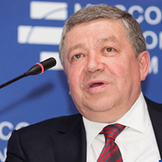
Program
Key theme: “Russia and the world: the future image”
- Which changes are expected by Russian society and Russian economy?
- New course: who and how should begin?
- Is the government ready for significant changes in the economy: a radical reduction in the tax burden, a reduction in the cost of loans and energy resources, and the introduction of protective mechanisms for the national industry?
- Will there be incentives for regional development: expanding the powers of regional and municipal authorities, strengthening the financial base of regions, territorial development plans, introducing minimum necessary social security standards, creating high-quality jobs in the regions?
- What economic policy will stimulate our country to accelerate the transition to a new technological order? How to launch the development of a scientific and technological base? Who should set goals and plan for the development of science? How to increase the implementation of Russian scientific developments in the economy? How to make science attractive for young people?
Moderator:
Konstantin Babkin, Co-chairman of the Moscow Economic Forum, President of Industrial Union “New Commonwealth”
Speakers:
Alexander Sergeev, Academician of RAS, President of the Russian Academy of Sciences
Sergey Glaziev, Academician of the Russian Academy of Sciences, Advisor to the President of the Russian Federation
Pavel Grudinin, Director of CJSC "State farm named after Lenin", a candidate for RF President in 2018
Evgeniy Savchenko, Corresponding Member of RAS, Governor of Belgorod Region
Oksana Dmitrieva, Member of the Budget and Finance Committee of the St. Petersburg Legislative Assembly
Robert Nigmatulin, Academician of RAS, scientific director of the Institute of Oceanology named after P.P. Shirshov
Boris Titov, Authorized by RF President for the Rights of Entrepreneurs Protection, a candidate for RF President in 2018
- Will the alienation of Russia and the West increase? Are there chances to prevent the deployment of a new Cold War?
- Is there a cure against the triumphalism of the West and the syndrome of the Russian "big brother"?
- Who and how should manage the economy of the new order?
Moderator:
Ruslan Grinberg, co-chairman of Moscow Economic Forum, Scientific Director of the Institute of Economics of RAS, Corresponding Member of the RAS
Speakers:
Valery Garbuzov, Director of the USA and Canada Institute
Wang Wen, Executive Dean, Chongyang Institute for Financial Studies, Renmin University of China (RDCY)
Grzegorz Kolodko, Professor of Kozminsky University, Minister of Finance of Poland (1994–1997, 2002–2003)
Thierry Mariani, Minister of Transport of France (2010-2012), Honorary Member of the French Parliament, President of the French-Russian Dialogue
Leonid Ivashov, Colonel-General, President of the Academy of Geopolitical Problems
Falk Tischendorf, Managing Partner of the Moscow office of the legal company BEITEN BURKHARDT, official representative of the Federal state of Mecklenburg-Western Pomerania (Germany) in Russia
Andrey Kortunov, General Director of the Russian Council on Foreign Affairs
- What difficulties do not allow increasing economic cooperation of our countries on a scale worthy of the level of strategic partnership?
- What new moments in the advancement of the "Belt and the Way" initiative will appear after the 19th Communist Party of China Congress and the session of the National People's Congress?
- What aspects of the "Belt and the Way" initiative primarily meet the national interests of Russia and other participants of the Eurasian Economic Union?
- What export opportunities from Russia and other countries of the Eurasian Economic Union opens a rapid growth of welfare and consumption in China during the implementation of the "Chinese Dream" plan?
- What are the reasons for building political, military and economic deterrence around Russia and China?
Participants:
Alexander Ageev, Academician of RANS, President of Economic Strategies Institute of RAS;
Konstantin Babkin, co-chairman of Moscow Economic Forum;
Andrey Belyaninov, Chairman of the Board of Eurasian Development Bank;
Wang Wen, Professor and Executive Dean at the Financial Studies Institute of Chinese People's University;
Sergey Glazyev, Academician of RAS;
Viktor Glukhikh, honorary president of the Industrialists and Entrepreneurs International Congress;
Mikhail Ershov, Chief Financial Research Director of Energy and Finance Institute;
Alexander Nagorny, Deputy Chief Editor of the newspaper "Zavtra";
Victoria Perskaya, director of the Institute of World Economics researches in the Financial University;
Sergey Luzyanin, Director at the Institute of Far Eastern Studies of the Russian Academy of Sciences;
Dmitry Mityaev, Director of the Center for System Forecasting;
Vladimir Remyga, General Director of the Eurasian Center for High Technologies;
Sergei Sidorsky, a member of the Board (Minister) for Industry and Agro-Industrial Complex of the Eurasian Economic Commission
Rustam Temirgaliyev, General Director of the Managing Company of the Russian-Chinese Investment Fund for Regional Development
Xing Guangcheng, director of the Institute for the Study of Border Problems of China, Chinese ASS
Li Jingyuan, Plenipotentiary Minister of the Chinese Embassy, Counselor for Trade and Economic Affairs;
Chen Zhigang, Deputy Chairman of the Union of Chinese Entrepreneurs in Russia, General Director of the Russian-Chinese Business Park, St. Petersburg.
Moderator:
Yuri Tavrovsky, Orientalist, the Russian University of Peoples' Friendship Professor
- Is the priority paradigm of support for agroholdings correct?
- What is the practice of developing a cooperative economy in Scandinavian agriculture?
- What are the facts of latifundia limitation in Europe?
- Rural development: for whom, for what, and who is against?
- Changes in national structure of rural areas: whether there are risks?
- The Future of Russian agricultural sector: how to disrupt the anchor and step beyond the horizon?
Participants:
Vyacheslav Baburin, Head of Economic and Social Geography Department at the Geography Faculty MSU;
Valery Belsky, Director of the State Economics Institute, Belarusian National Academy of Sciences;
Marina Mityanina, The embassy attaché of the Denmark Kingdom in the Russian Federation concerning food, agriculture and fish breeding;
Alexander Nikulin, Director of the Agrarian Research Center in RANEPA under the RF President;
Alexander Petrikov, Head of the All-Russian Institute of Agrarian Problems and Informatics named after A.A. Nikonov, Academician of RAS;
Natalia Shagaida, Director of the Agro-Food Policy Center in RANEPA under the RF President.
Moderators:
Igor Abakumov, publisher of the portal "Krestyanskiye Vedomosti", candidate of economic sciences
Ivan Ushachev, Academician of the Russian Academy of Sciences, scientific director of the Center for Agricultural Economics and Sustainable Development of Rural Territories of FASO
- Is Russia ready for response to modern technological challenges?
- How does new modern technologies affect the functioning of economic systems?
- Is it possible to build a digital economy in Russia without the development of industry?
- What priority measures should be taken to ensure that Russia could take a worthy role in the modern industrial landscape?
Participants:
Alexander Varshavsky, head of the laboratory at the Central Economic and Mathematical Institute of RAS;
Shota Khabelashvili, General Director of the GC "Mosstroy-31";
Georgy Malinetsky, head of the department at the Applied Mathematical Institute named after MV Keldysh;
Dmitry Sorokin, Corresponding Member of RAS, scientific supervisor of the Financial University under the RF Government;
Vladimir Suprun, Director of the Socio-Prognostic Research Foundation "Trends";
Sergey Tolkachev, First Deputy Head of the Economic Theory Department in Financial University under the RF Government;
Vladimir Filatov, the Head of the center of Economics Institute in RAS.
Moderators:
Elena Lenchuk, Director of the Economic Institute of RAS
Vladimir Ivanov, Deputy President of RAS, Corresponding Member of RAS
- What is the center and region's role in the spatial development of Russia?
- How to overcome the metropolitan monocentrism in the spatial development of Russia?
- What should be the basis of the federal strategy of spatial development?
- Will the change of governors help the economic development of the regions?
Participants:
Evgeny Bukhvald, Doctor of Economics, Head of the Center for Federal Relations and Regional Development
Sergey Valentei, Scientific Director of the Russian Economic University named after G.V. Plekhanov
Leonid Vardomsky, Head of the Center for Comparative Studies and Transformation of the RAS Economics Institute
Irina Grishina, Deputy Chairman of the Council for the Study of the Productive Forces of the All-Russian Foreign Trade Academy
Vladimir Klimanov, director of the Public Finance Reform Institute, member of the Board of Independent Economic Analysis Centers Association;
Olga Kuznetsova, Chief Researcher of the Federal Research Center "Informatics and Management" of RAS
Andrei Polynev, deputy head of the Council for the Study of the Productive Forces of the All-Russian Foreign Trade Academy
Irina Rozhdestvenskaya, Head of the Center for Scientific Research and Technical Regulation in the Service Sector
Nadezhda Mikheyeva, Chief Researcher of the Economic Forecasting Institute RAS
Renald Simonyan, hief Scientific Officer at the Center for European Studies, Institute for International Studies, Moscow State Institute of International Relations.
Moderator:
Alexander Shvetsov, Deputy Director of the Systems Analysis Institute, Federal Research Center "Informatics and Management" RAS
- Is censorship necessary and permissible? Who sets boundaries in culture today: the state, society or creator? Religion and national traditions make their limitations?
- Borders and boundaries of freedom. How to deal with manipulation and dangerous information that spreads through the Internet, the media and creative products? Art and the problem of falsifying history.
-State policy in the field of development and financing of cultural projects - effective or not? Where is the balance between the interests of the state and freedom of creativity?
Participants:
Vitaly Averyanov, Deputy Chairman of the Izborsk Club
Joseph Diskin, Chairman of the Commission on Harmonization of Interethnic and Interreligious Relations of the RF Public Chamber
Egor Kholmogorov, political writer, blogger
Boris Nadezhdin, President of the Regional Projects and Legislation Institute
Ivan Preobrazhensky, Political scientist, European commentator Rosbalt, columnist of Deutsche Welle
Kirill Razlogov, President of the New Institute of Culturology
Yuri Ryazanov, Chairman of the Film Forum and Festival "VVERKH", Producer
Igor Ugolnikov, Russian actor, film director, president of the State budgetary cultural institution of Moscow "Moskino"
Moderator:
Marine Voskanyan, journalist, political analyst, MEF international links coordinator, Member of the MEF Organizational Committee
- Banking system of Russia: what was constructed during 25 years?
- Global financial trends and the Russian financial sector: who is out of step?
- What is the Bank of Russia's responsibility for ensuring economic growth?
- Small and medium-sized banks: Is there life in the regions?
- Lending to economic development: how to ensure accessibility?
Participants:
Marina Abramova, Deputy Head of the Financial Markets and Banks Department, Financial University under the RF Government;
Mikhail Ershov, Chief Financial Research Director of the Energy and Finance Institute;
Vladimir Kozinets, President of the Corporate Treasurers Association;
Konstantin Krinichansky, Professor of the Financial Markets and Banks Department, Financial University under the RF Government;
Nikolay Nikolayev, head of the "Prevyshentsy Yugry" group;
Roman Prokhorov, Chairman of the Board of the "Financial Innovations" Association;
Pavel Samiev, General Director of LTD "BiznesDrom", Managing Director of the NRA;
Arkadiy Samokhvalov, First Class State Councilor of RF;
Oleg Solntsev, Head of the Monetary Policy and Banking System Analysis Department, Macroeconomic Analysis andShort-Term Forecasting Center;
Garegin Toseunyan, President of the Russian Banks Association;
Aleksandr Khandruyev, vice-president of the Russian Banks Association.
Moderator:
Vladimir Gamza, Chairman of the Russian CCI Committee on Financial Markets and Credit Organizations, Managing Partner of DDP GROUP
- Russia's withdrawal from the WTO: pros and cons?
- International WTO alternatives: the way to equal trade or ranting and PR?
- Were there any positive effects from WTO membership for Russia?
- Why did the WTO not "save" Russia from sanctions?
- Successful foreign trade policy: a unique experience of world countries.
Participants:
Daniel Agramont, Economic Development Coordinator at the Friedrich Ebert Foundation, consultant to the Bolivian Government on WTO issues
Oleg Boldyrev, Assistant at the Department of Constitutional and Municipal Law, the Faculty of Law, MSU named after MV Lomonosov
Vyacheslav Evseev, Director of the Center for the Study of Customs Tariff and Non-Tariff Regulation
Aleksandra Zhdanovskaya, political scientist, author of the book "Where does Russia go for the IMF, the World Bank and the WTO?"
Oleg Noginskiy, Chairman of the "Customs Union Suppliers" Association
Vladimir Samokhvalov, managing partner of SBS Consulting
Nikolai Starikov, writer, publicist
Vladimir Khomyakov, co-chairman of the movement "Narodnyy Sobor"
Javier Echaide, organizer of the Counter-Summit against the WTO in Buenos Aires, assistant professor at the University of Buenos Aires (UBA).
Moderators:
Nikolai Kolomeitsev, First Deputy Chairman of the State Duma Committee for Labor, Social Policy and Veterans Affairs
Vyacheslav Pronin, Head of the Analytical Center "WTO-INFORM", the Assistant of the Rosspetsmash Association President
- Does the pension system have a future?
- The reasons for the Pension Fund deficit: the growth of expenses or the fall in income?
- Working pensioners: infringement of social rights or violation of economic insurance principles?
- Is it really necessary to raise the retirement age?
Participants:
Olga Alexandrova , Deputy Director for Research at the Institute for Social and Economic Problems of Population of RAS, Professor of the Sociological Department at the Financial University under the RF Government
Elena Bibikova, member of the Central Control Commission, member of the Federation Council in the RF Federal Assembly
Dmitry Ermakov, Professor, Department of Management, Financial University under the RF Government
Boris Kashin, Academician of RAS, Chairman of the Actuarial Council of the State Duma Committee on Financial Markets
Tatyana Kulikova, associate professor at the Mechanics and Mathematics Faculty of MSU named after M.V. Lomonosov
Vyacheslav Oykin, Deputy Manager of the RF Pension Fund for the Ivanovo region;
Andrey Pudov, State Secretary, RF Deputy Minister of Labor and Social Protection;
Dmitry Pomazkin, Head of the Development Programs Department at the Non-State Pension Fund "GAZFOND"
Lyudmila Rzhanitsyna, Chief Scientific Officer, Institute of Economics, RAS
Svetlana Solyannikova, Head of the Public Finance Department at the Financial University under the RF Government
Mayya Toksonbayeva, leading researcher at the Institute of Social and Economic Problems of Population of RAS
Elvira Tuchkova, Head of the Department at the Moscow State Law Academy named after O.K. Kutafina
Marina Fedotova, Head of the Corporate Finance and Corporate Governance Department;
Igor Shanin, member of the Committee of Russian Independent Trade Unions
Vyacheslav Sherstnev, Chairman of the Council of Professional Actuaries Association
Moderator:
Arkady Solovyev, Head of the Actuarial Settlements and Strategic Planning Department of Pension Fund, Professor of Financial University under the RF Government
- How to accelerate the growth of the economy and diversify its structure at the same time?
- What does modern economic thought suggest in this respect?
- Why will not quantitative easing help the Russian economy?
- What unites and what separates Russian perfectionists and interventionists?
- What industrial policy do modern Russia need: support for all or building priorities?
- Is coherence and spatial development of Russian territory a priority goal for the future government?
Participants:
Anatoly Aksakov, Chairman of the State Duma Committee on Economic Policy, Innovative Development and Entrepreneurship;
Sergey Arbuzov, Chairman of the Association "Center for Studies of Economic and Socio-Cultural Development in the CIS, Central and Eastern Europe";
Andrei Bunich, President of the Entrepreneurs and Tenants Russian Union;
Sergey Kalashnikov, First Deputy Chairman of the Committee on Economic Policy in the Federation Council;
Andrey Klepach, Deputy Chairman of Vnesheconombank (Chief Economist) - member of the Management Board;
Yakov Mirkin, Head of International Capital Markets Department of IWEIR RAS;
Igor Nikolayev, Partner of the Fight against Corruption Foundation, Director of the Institute for Strategic Analysis;
Jacques Sapir, Scientific Officer of the Higher School of Social Sciences (EHESS), Director of the Center for Industrialization Research CEMI-EHESS;
Ivan Starikov, Head of the Center for Economic Strategies, Institute of Economics, RAS;
Vladimir Filatov, Head of the Center for Innovative Economics and Industrial Policy, Institute of Economics, RAS;
Sergey Khestanov, Advisor to the General Director of «Otkrytiye Broker» on macroeconomic issues.
Moderator:
Ruslan Grinberg, co-chairman of Moscow Economic Forum, Scientific Director of the Institute of Economics of RAS, Corresponding Member of the RAS
- How serious is the attempt of protectionists to undermine the foundations of liberal globalization?
- Why the WTO is silent? Whether there is hypocrisy for it is allowed for the strong, and forbidden for the weak?
- Can the regionalization of the world economy be viewed as a substitute for globalization?
- How to find the best balance between the openness of the domestic market and the support of the national producer?
- How should Russia act under these conditions?
Participants:
Andrey Berezhnoy, General Director of Ralf Ringer Company
Vladislav Zhukovsky, Managing Director of Triumph Capital
Alexey Portanskiy, Professor of NRU HSE, Leading Research Associate at the Institute of World Economy and International Relations RAS
Sergey Serebryakov, Director of JSC "Petersburg Tractor Plant"
Mark Urnov, Research Professor at the Faculty of Social Sciences NRU HSE
Darya Ushkalova, Head of the Research Center for International Macroeconomics and Foreign Economic Relations, RAS Institute of Economics
Moderator:
Vladimir Obolensky, Chief Researcher at the Institute of Economics of RAS, Doctor of Economic Sciences, Professor
- Social sphere - the sphere of services or human reproduction?
- Social sphere budget: "the burden of the state" or human investment?
- What kind of modernization is possible in the 21st century: at the expense of a person or on the basis of human potential?
- Quality education: segregation or equal opportunities?
- Medicine: budgetary or insurance?
- Why is the share of paid medical services growing in Russia?
- Cultural sphere: the crisis of humanitarian values or the destruction of "national cultural codes"?
Moderator:
Oleg Smolin, First Deputy Chairman of the Committee on Education and Science in the State Duma of the RF, Chairman of the All-Russian Public Movement “Education for all”
Speakers:
Olga Golodets, Deputy Chairman of the Russian Federation Government
Marco Riccheri, General Secretary of the European Institute for Political, Economic and Social Research (EURISPES)
Elena Drapeko, First Deputy Chairman of the State Duma Committee on Culture
Pavel Vorobyov, Governor's Counselor of Orel Region, Head of Hematology and Geriatrics Department of IPE in the First Moscow State Medical University named after Sechenov (1998-2018), Chairman of the Moscow City Scientific Society of Physicians
Vladimir Ivanov , Deputy President of the Russian Academy of Sciences, Corresponding Member of the RAS
Valentina Muzychuk, Deputy Director for Research at the Institute of Economics of the Russian Academy of Sciences, Professor of the Producer Department of the Moscow Art Theater School
Nina Kuzmina, Deputy Chairman of the Russian Independent Trade Unions Federation, Rector in the Academy of Labor and Social Relations
- The crisis of the post-World War II global order (so called “the Yalta-Potsdam order”) and what new order will replace it? What main characteristic will this future world order and new global governance system have? Will its creation be chaotic or controllable?
- The new power balance in the world (the change in relation to geo-economic and military-political potentials). The raise of China and possible bi-polar conflict scenario between China and the U.S. The possible formation of the third (independent and non-aligned) global pole as a balancing factor for the future world order.
- The USA and some European powers try aggressively to isolate Russia and restrain its role in the world policy. What are the origins and reasons of the modern Russophobia? Is it irrational or conscious behavior of the West? Which perspectives does Russia have as an active player in the future world order?
Participants:
Dmitry Danilov, Head of the Department for European Security, Institute of Europe of the Russian Academy of Sciences, Professor of MGIMO-University
Srdja Trifkovic, Foreign Affairs Editor of Chronicles: A Magazine of American Culture, Professor of International Relations;
Alexander Rahr, Professor, Science Director of the German-Russian Forum, Political Analyst
Guy Mettan, President of Swiss-Russian Chamber of Commerce, formerly Editor-in-chief of Tribune de Genève; Swiss Politician (Christian Democrat Party) , Head of the Swiss Press Club
Aymeric Chauprade, Member of the European Parliament, Professor in Geopolitics
Dmitry Ryurikov, Ambassador Extraordinary and Plenipotentiary, Assistant for International Affairs to the President of Russian Federation (1991-1997), Ambassador of Russia to Denmark (2003-2007), Ambassador of Russia to Uzbekistan (1999-2003)
Willy Wimmer, Former Vice President of the OSCE Parliamentary Assembly (1994-2000), Former State Secretary to Germany's Defense Minister (1988–1992), Member of the German parliament, the Bundestag (1976 – 2009)
Moderator:
Andrey Kobyakov, Member of the MEF Organizing Committee, economist and political analyst
- What was the main issue to resolve on these elections?
- What are the possible solutions of the main issue from different political forces?
- What direction of future development was presented by each of the candidates?
- What was the mechanism of public discussion - have the main issues become the main subject of discussion?
- Which not personal, but meaningful decision did we receive as a result of the elections?
- Elections are held and the result is obtained - what are the main directions of the public discussion about the ways of the country's development at this new stage?
Participants:
Mikhail Abramov, President of the Expert-Analytical Center "Modernization"
Victor Alksnis, confidant of candidate PN. Grudinin
Pavel Grudinin, director of the closed joint-stock company "State farm named after Lenin", a candidate for the post of RF President in 2018
Vladimir Kashin, State Counselor of the Tax Service of II rank
Nikolai Kolomeitsev, Deputy of the RF State Duma, RF Communist Party
Bulat Nigmatulin, President of the Problems of Natural Monopolies Institute
Andrey Savelyev, chairman of the party "Velikaya Rossiya";
Nikolai Sapozhnikov, deputy of the RF State Duma, member of the Central Committee of the RF Communist Party in 2000-2004;
Vasily Simchera, head of the expert group under the candidate Pavel Grudinin
Vladimir Filin, coordinator of the Russian Permanent Meeting of the National-Patriotic Forces
Moderator:
Yuri Boldyrev, Member of the Editorial Board of the Russian business magazine, economist, writer
- Can administrative and legal reforms be considered as conditions for economic growth?
- What is the relationship between private investment and public policy?
- How do technological changes affect economic growth?
- Is it possible to transform social policy into the growth driver?
Participants:
Alexey Golubovich, Managing Director of Arbat Capital
Igor Lavrovsky, executive director of the Stolypin Club
Aleksandr Makhlayev, Director of the Social Funding Fund
Dmitriy Chistilin, Candidate of Economic Sciences, Academician of the RANS, Director of the International Institute for Development and Self-Organization named after Simon Kuznets
Valery Chichkanov, Plenipotentiary Representative of the President of RAS, Corresponding Member of RAS
Andrew Yatsun, General Director of «Affordable Housing» Group of Companies
Moderators:
Igor Morozov, Deputy Chairman of the Federation Council Committee on Science, Education and Culture
Nikolai Ostarkov, vice-president of "Business Russia"
Questions for discussion:
- What are the causes of the social-democratic crisis?
- Is the Social Democratic ideology in its classical form obsolete and no longer so in demand in modern society?
- Why are modern leaders of social democratic parties not popular?
- Have traditional partners of Social-Democrats (trade unions, youth, women's and other civil society organizations) turned away from them?
Participants:
Mikhail Voyeikov, Head of the Political Economy Sector, Center for Methodological and Historical and Economic Studies, Institute of Economics RAS
Gennady Gudkov, politician, president of the Support for Democratic Reforms Foundation
Boris Romanov, observer of the Internet magazine "Socialist", Institute "Fair World"
Oleg Komolov, Junior Researcher, Center for International Macroeconomics Research, Institute of Economics, RAS
Boris Romanov, Observer of the Internet magazine "Socialist", Institute "Fair World"
Oleg Molchanov, Russian Association of Political Consultants, Doctor of Laws
Yuri Pavlenko, Chief Researcher, Institute of Economics, RAS
Boris Slavin, Assistant to the Gorbachev Foundation President, Doctor of Philosophy, Professor, Member of the Academy of Political Sciences
Mirko Hempel, Head of the Friedrich Ebert Foundation in the Russian Federation
Oleg Shein, Member of the State Duma Committee on Labor, Social Policy and Veterans Affairs
Vladimir Schweitzer, Head of the Center for Party Political Studies, Institute of Europe, RAS
Vladimir Fomenko, Deputy Head of the Rosa Luxemburg Foundation (Branch in Russia)
Vitaly Shibko, deputy of the Ukrainian Verkhovna Rada in 2002-2007, Socialist Party of Ukraine
Alexander Tsipko, Chief Researcher, Institute of Economics, RAS
Moderator:
Boris Guseletov , Leading Researcher in the Department of Social and Political Studies, Institute of Europe, RAS
- What should business and population be prepare for in conditions of new old political period?
- How will the tax and administrative regime change after the elections?
- When the transition from the policy of "fiscal consolidation" and tightening the screws to the development and growth strategy appear?
- Will there finally be a denial of monetary authorities from the policy of bleeding the economy?
- Risks of isolation - where and how to find financial resources and technologies in conditions of sanctions?
On the topic of the discussion:
While experts predict changes in economic policy after the elections, entrepreneurs are trying to adapt to the existing system of state regulation. Unlike theorists, there are no optimistic expectations in a professional environment. How can Russian traders work in the context of the economic crisis and international sanctions imposed by Western countries? Are there any prospects for small business development in Russia?
Moderators:
Vladislav Zhukovsky, Managing Director of Triumph Capital
Dmitry Potapenko, Managing Partner, of Management Development Group
"Has the war begun or not?" What factors determine this?
Is it possible today to weaken international tension? What compromises will the sides have to agree on?
- What are the differences between the new cold war and the first Cold War?
- Is there a chance to block the arms race?
- Does Russia have allies that are close to Russia's position?
- The "Russia-Ukraine" conflict - the ways of de-escalation
- Non-standard side moves and flank strikes?
Participants:
Victor Mironenko, Leading Researcher, Central and Eastern Europe Department, Institute of Europe, RAS
Mikhail Remizov, Russian political scientist and publicist, journalist, president of the National Strategy Institute
Andrey Fefelov, journalist, publicist, editor-in-chief of the TV channel "Day-TV", deputy editor-in-chief of the newspaper "Zavtra"
Alexander Tsipko, Senior Researcher, Institute of Economics, RAS
Moderator:
Yuri Krupnov, the Chairman of the Supervisory Board in the Demography, Migration and Regional Development Institute
- Sovereignty against globalism. Globalization requires: refraining from protecting its economy in favor of Transnational Companies, refraining from raising the level of incomes of its able-bodied population in favor of cheap immigrant labor, abandoning an independent foreign policy. How to preserve sovereignty and ensure the priority of national interests in the economy and politics?
- National identity. How can Russia, European countries and Europe as a whole preserve their cultural, civilizational and economic identity?
- Protectionism in relation to the national economy. How are the countries defending their own producer, opposing the globalist neo-liberal economic model and respecting each other's economic sovereignty, can interact productively and carry out economic cooperation?
Participants:
Eliseo Bertolasi, co-founder of the Culture Association "Veneto-Russia", political writer, geopolitical analyst at the Institute on Advanced Studies in Geopolitics and Auxiliary Sciences (IsAG), Rome
Aymeric Chauprade, Member of the Euporean Parlament, Professor of Geopolitics
Oskar Freysinger, Vice-President of the Swiss People's Party, former Member at the National Council of Switzerland
Gerard Hardy, Chairman of the Volontaires pour le France
Zoran Radojicic, Member of the Presidium of the Serbian political party "DVERI", Member of the Serbian Parliament
Bakyt Torobaev, Member of the Parliament of the 6th Kyrgyz Republic convocation, leader of the parliamentary faction "Onuguu-Progress"
Srdja Trifkovic, Foreign Affairs Editor of Chronicles: A Magazine of American Culture, Professor of International Relations
Moderator:
Alexey Lapushkin, Secretary of the Federal Board of “PARTIA DELA”
The whole sphere of media, social networks, information exchange and communications has turned into a field of endless geopolitical confrontation.
- Is this the result of the new formats of information or is it already an essential part of the modern social and political interaction?
- Who is interested in a transformation of the information space into an aggressive and manipulative environment?
- What is the role of the professional media and leading IT corporations in this process?
- Is there a chance, that the new information war comes to an end? What should be done to return a media and an expert discussion into a rational and reasoned direction?
Participants:
Andrey Bezrukov, Associate Professor at the MGIMO Institute of International Relations of the Russian Ministry of Foreign Affairs
Leo Ensel, conflictologist, intercultural communications trainer (In Post-Soviet Region, Eastern and Central Europe)
Thierry Mariani, Minister of Transports of France (2011-2012), Honored Member of the French National Assembly, President of the French-Russian Dialogue
Bruce W. McConnell, Global Vice Presedent, EastWest Institute (San Francisco, USA), co-director of Secretariat, The Global Commission on the Stability of Cyberspace, Deputy Under US Secretary for Cybersecurity in 2013
Ivan Preobrazhensky, Political scientist, European commentator Rosbalt, columnist of Deutsche Welle
Hauke Ritz, German philosopher and political writer
Willy Wimmer, Former Vice President of the OSCE Parliamentary Assembly (1994-2000), Former State Secretary to Germany's Defense Minister (1988–1992), Member of the German parliament, the Bundestag (1976 – 2009)
Moderator:
Marine Voskanyan, Journalist, political scientist, member of the organizing committee of the MEF
- What is the level of staff coverage of the priority sectors? What professions are the youth oriented at? Where do future engineers and workers plan to work after graduation?
- How does the the quality of the training of engineering and technical personnel, agrarians, industrial and agricultural workers change?
- What are the horizons of enterprise planning and how does this affect the work of higher education and the vocational education system? Are there prerequisites for strategic planning of labor resources?
Participants:
Anatoly Batayev, professor, rector of the Novosibirsk State Technical University;
Andrei Biryukov, President of the YAROVIT Holding, co-chairman of the Public Chamber in the Russian Federation and Belarus State ;
Arseniy Brykin, Deputy General Director for Development of RosElectronics, JSC, Professor of the Financial University under the RF Government;
Sergey Kosogor, Deputy Director of the Analytical Center at the Russian Ministry of Agriculture;
Irina Sobolev, Head of the Center for Employment Policy and Social and Labor Relations, Institute of Economics RAS;
Alexander Tyurikov, professor, head of the Sociological Department at the Finance University under the RF Government;
Vyacheslav Shamarin, vice-president of the Voronezh region Chamber of Commerce and Industry, general director of the Exhibition Center.
Moderator:
Olga Alexandrova, Deputy Director in the Institute of Social and Economic Population Problems RAS, Professor of the Sociological Department in the Financial University under the RF Government
- Is there money in Russia and is it enough to solve the problems of the economy?
- Is additional emission needed and what role does the banking discount rate play?
- What can the budget get from improving the tax system?
- How do customs fees affect budget revenues?
- How effective is natural rent?
- What impedes the development of production in Russia?
- What needs to be done to increase customer demand?
- How effective are budget revenues?
Participants:
Mikhail Bocharov, Director of the Center for Strategic Studies, in 1990-1991 - Chairman of the Higher Economic Council under the Presidium of the Supreme Soviet of the RSFSR
Igor Gundarov, head of the laboratory at the Moscow Medical Academy named after I.M. Sechenov
Mikhail Ershov, Director for Financial Studies at the Institute of Energy and Finance, Professor of the Finance University under the Government of the Russian Federation;
Vladimir Kashin, state adviser of the II rank in the tax service
Georgiy Maltsev, Head of Investment Department Group of Companies "Result"
Robert Nigmatulin, Academician of RAS, Scientific Leader at the Institute of Oceanology named after P.P. Shirshov
Vasily Simchera, Vice-President of the Russian Academy of Economic Sciences, Honored Scientist of the Russian Federation.
Moderators:
Mikhail Abramov, President of the EAC "Modernization"
Dmitriy Sorokin, supervisor of the Financial University under the Government of the Russian Federation, Corresponding Member of the RAS
- Unity of the noospheric mode of social production, as the unity of the noospheric productive forces and production relations; as the basis for the mechanisms of the growing reproduction of civil quality and the Russian population.
- The problem of overcoming the Barrier of Difficulty as a problem of the ascending reproduction of human quality, social intelligence and educational systems in society.
- Transition to the noospheric paradigm of strategy and the mechanisms of the ascending reproduction of the Russian population.
Participants:
Boris Bolshakov, Head of the Chair of Sustainable Innovative Development, State University "Dubna"
Valentina Dobrokhleb, Head of the Laboratory of Gender Problems, ISEPN RAS
Lyubov Gordina, President of the Noospheric Spiritual and Ecological Assembly of the World
Nikolay Zakharov, Professor of the State University "Dubna"
Ivan Kozikov, Professor of Social and Political Department, Lomonosov Moscow State University
Oleg Rogachevsky, Assistant to the First Deputy Government of the Altai Republic
Vadim Tatour, Executive Director, NO Fund of Advanced Technologies and Innovations
Arkadiy Ursul, Director of the Center for Global Processes Research, Lomonosov Moscow State University
Moderators:
Vyacheslav Bobkov, Head of the Laboratory for Problems of Level and Quality of Life, ISESP RAS, Head of the Moscow Department of the Noosphere Social Academy of Sciences, Honored Scientist of the Russian Federation
Alexander Subetto, Advisor to the rector of the Smale Institute RAE, Professor RSPU named after AI Herzen, Honorary Professor of Novgorod State University named after Yaroslav the Wise, President of the Noosphere Social Academy of Sciences, Honored Scienti
The global financial and economic crisis of 2008-2009 actualized the discussion on the problems of modern economic theory.
- What ideas will prevail in the mainstream of economic thought in the foreseeable future? For the time being, it is only possible to state the death of two great utopias - the "directive plan" and the "free market".
- What will come to replace them? A new edition of the social market economy or
"Etatist" concepts of economic development prevailing in Asian countries?
Participants:
Sergey Glazyev, Academician of RAS, Adviser to the RF President on Regional Economic Integration Issues
Delyagin Mikhail, Director of the Institute for Globalization Problems
Alexander Khudokormov, Head of the History of National Economy and Economic Studies Department, Faculty of Economics, Moscow State University named after MV Lomonosov
Ruslan Khasbulatov, Head of the World Economy Department, Russian Academy of Economics named after G.V. Plekhanov, Corresponding Member of RAS
Dmitry Mityaev, Director of the Center for System Forecasting
Mark Urnov, Professor-Researcher, Faculty of Social Sciences, HSE
Moderator:
Ruslan Grinberg, co-chairman of Moscow Economic Forum, Scientific Director of the Institute of Economics of RAS, Corresponding Member of the RAS
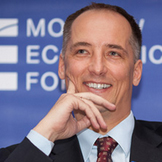
In 2004 he was awarded the National prize named after Petr Arkadyevich Stolypin in a special nomination «For contribution to the development of agro-industrial complex of Russia».
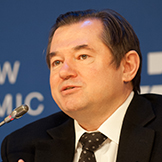
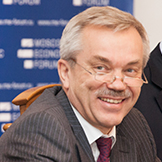
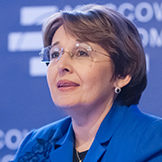
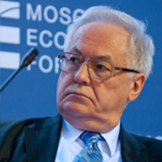
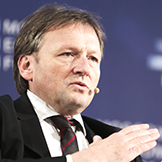
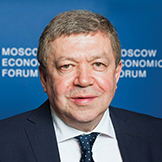
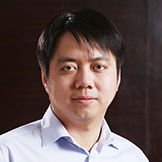
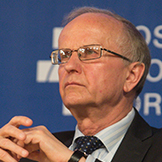
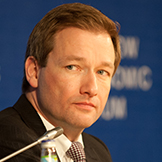
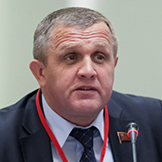
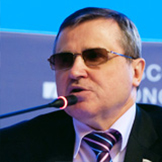
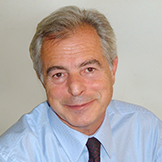
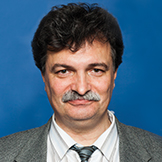
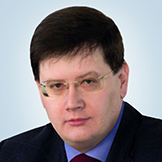
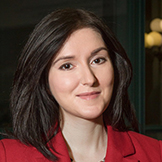
Participation
Participation is fee-based. Registration for the MEF-2018 opens on 01 february 2018 (for participation in events on 3–4 April).
To participate you must fill out this registration form and receive a confirmation to Your e-mail. Entrance to the registration area is allowed upon presentation of a participation confirmation or a badge.
Please note that the International Committee of the Forum reserves the right to refuse participation to any person without explanation.
Contacts
e-mail: info@me-forum.ru
Address: 121609, Moscow, Osenniy blvd, 23 (Business Centre «Krylatskiy»)
Our English speaking managers:
Dzyuba Matthew
т. +7 (495) 781 37 15
md@me-forum.ru
